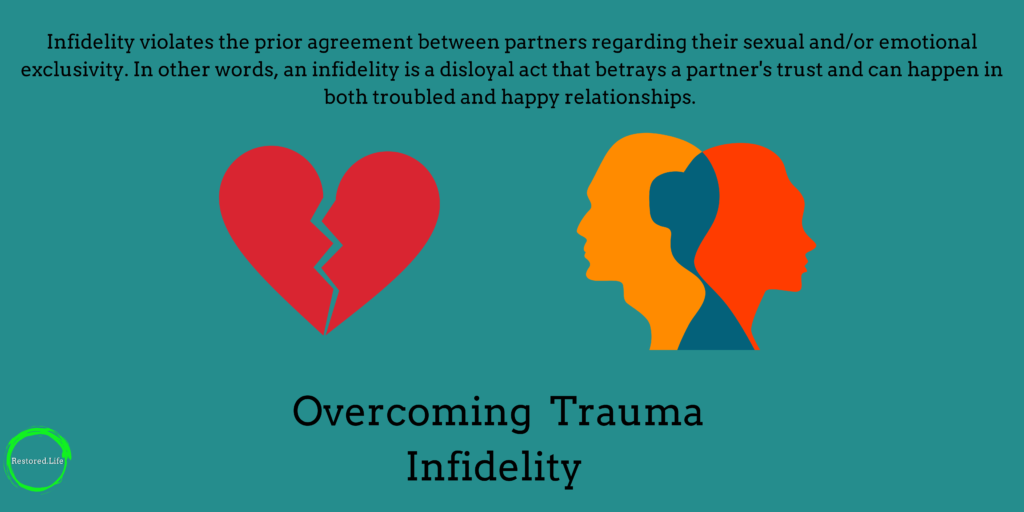What is the definition of infidelity?
Infidelity violates the prior agreement between partners regarding their sexual and/or emotional exclusivity. In other words, an infidelity is a disloyal act that betrays a partner’s trust and can happen in both troubled and happy relationships.
How do you start healing from infidelity?
There are many ways that couples can begin the healing process if infidelity occurs. Here are a few of those ways:
- Seek couples therapy
- Realize that the truth doesn’t always come out all at once
- Problems within the relationship did not cause the affair but are important for change between the partners
- Understand that the need for trust goes for parties and travels in both directions
Can infidelity cause post-infidelity stress disorder (PISD)?
Depending on the person and the situation, PISD may occur due to infidelity. Some symptoms of PISD are fear, helplessness, confusion, and intrusive thoughts. Individuals may try to protect themselves by avoiding reminders of the events.
How do you deal with PISD?
A few ways that help individuals deal with PISD include:
- Not blaming oneself
- Learning how to trust again
- Practicing self-care
- Schedule a time to worry
- Acknowledge your feelings
- Find support
- Establish healthy boundaries
What is post-traumatic stress disorder (PTSD)?
PTSD occurs after a shocking and traumatic event within an individual’s life. This disorder is commonly known among war veterans who have witnessed and experienced many traumatic events while overseas. However, PTSD can occur in individuals who have suffered many other types of abuse or neglect like physical abuse, sexual abuse, a major car accident, verbal abuse, losing a loved one, and many other instances.
How do you forgive the offending partner who was involved in the infidelity?
Forgiveness can be a healthy response to infidelity over time. Forgiving someone doesn’t justify their behaviors, yet opens up the door to build the relationship if the relationship is repairable and both partners want to continue to work on it. It is especially hard to forgive when the partner who is in the wrong does not apologize on their behalf and doesn’t own up to their actions or wrongdoing. The road ahead may not be easy, but intimacy and trust can be rebuilt if the individuals within the relationship are willing, able, and forgiving.
How does infidelity affect the brain?
The brain released different chemicals like dopamine and oxytocin when you are enjoying an aspect of life, like falling in love. Similarly, dopamine is triggered when we eat foods that bring us pleasure, like chocolate, pizza, or ice cream. Dopamine release is interrupted when a devastating event like infidelity occurs because the neural pathways within our brains are interrupted. This can have long-term and short-term effects on our brain chemistry after an infidelity incident occurs.
Does infidelity pain ever go away?
It may feel as if the pain that infidelity has caused an individual may never go away. Yet, there is hope. With time and therapy, individuals can heal from the hurt and despair of infidelity.
What effects does infidelity in a marriage relationship have on children?
- The child may side with the partner who is the victim
- The child may experience feelings of confusion, anxiety, abandonment, and isolation
- Some studies have found that children who had one parent that was unfaithful may have trust issues within their future romantic relationships
- The child may form negative perceptions of fidelity
Can infidelity cause mental illness?
As discussed above, infidelity may cause PTSD or PISD in individuals who were cheated on. Other symptoms may include flashbacks, nightmares, and obsessions about the event.
How do you know if the relationship is worth saving?
There may be a considerable amount of questions one might ask themself before dismissing a relationship or marriage. Here are a few:
- Why did you get into the relationship, to begin with?
- How does this person make you feel?
- What’s changed to make you question if the relationship is worth saving?
- Are you worth saving or fighting for?
- Does this person add value to your life?
- Have you been through hard times and made it out together?
What are the different forms of infidelity?
- Physical infidelity or physical affair: Physical or sexual connection occurs outside of the monoagomous relationship.
- Emotional affair: Occurs when there is an emotional attachment with another person.
- Cyber infidelity: This includes social media websites where people can message, chat and talk with others about sexual content, including erotic stimuli, like pornography.
- Financial infidelity: When one partner becomes deceitful about how much money they earn, how they earn that money, how much debt they owe, and how they spend or loan out money.
- Micro-cheating: These actions may be small, like flirting, and the partner may have no intention of straying outside the relationship, yet this can still cause damage.
- Combined infidelity: This occurs when the partner is engaging in one type of infidelity that consequently leads to another kind. For example, an individual who is involved in cyber infidelity may also be involved in emotional infidelity.

What are examples of non-sexual infidelity acts?
- Sending sexual or erotic texts to someone else
- Developing deep, intimate bonds with another person
- Maintaining online dating profiles
- Engaging in routine flirtation
- Hiding finances
- Hanging out with ex-partner
What are the emotional effects of having an unfaithful partner?
- Trust issues
- Commitment issues
- Intrusive thoughts
- Hopelessness
- Poor emotional regulation
- Confusion
- Becoming easily triggered
- Other unresolved issues
- Heightened anxiety
- Attachment issues
- Irritability and rage
- Worry or fear
- Withdrawal from social interaction
- Emotional pain
What does John Gottman, a relationship expert have to say about infidelity?
John Gottman discusses how individuals believe that cheating comes from nowhere, yet he suggests that the cheater heads down a slow, undetected pathway before the physical cheating occurs. Typically, there are underlying reasons and dysfunctions within the relationship before the cheating actions happen.
What are the different types of modalities a relationship therapist may use while treating infidelity?
- Emotion-Focused Therapy (EFT)
- The Gottman Method
- Integrative Approach
How long does it take to get over infidelity?
This is dependent on an individual basis. If the partner who has been unfaithful has only committed the act once, it may be easier for the healing process to take place. However, if there have been repeated acts over months or years of time, it may take a significantly longer amount of time for the healing process.
How can you start the recovery process from infidelity?
- Demonstrate sincere commitment to healing
- Working toward building the relationship
- Understanding the details of the infidelity
- Making efforts to rebuild trust
- Letting go of anger and resentment
Are there benefits to forgiving others when it comes to infidelity?
Studies have shown that the benefits of forgiving someone outweigh the costs of not doing so. These include:
- Improving sleep
- Lower blood pressure
- Reducing the risk of heart attack
- Lowering LDL cholesterol levels
- Reducing systemic pain and inflammation
(https://www.talkspace.com/blog/how-to-get-over-infidelity/)
What are some causes of infidelity?
- Extended periods of separation
- Addiction
- Lacking dedication in relationship
- Lacking communication in relationships related to emotional and sexual needs
- Major life events that change the nature of the relationship
- Mental health conditions
- Chronic health conditions
- Financial instabliity
- Fear of intimacy
- Personal dissatisfaction
